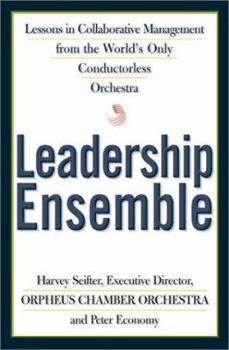Leadership Ensemble: Lessons in Collaborative Management from the Worlds Only Conductorless Orchestra
Select Format
Select Condition 
Book Overview
As the only major orchestra without a conductor, Orpheus Chamber Orchestra is a shining example of a highly effective management style based on collaborative leadership. Leadership Ensemble is... This description may be from another edition of this product.
Format:Hardcover
Language:English
ISBN:0805066926
ISBN13:9780805066920
Release Date:October 2001
Publisher:Times Books
Length:225 Pages
Weight:1.10 lbs.
Dimensions:0.9" x 6.1" x 9.8"
Customer Reviews
1 rating
Make Everyone an Effective Leader and Knowledge Worker!
Published by Thriftbooks.com User , 22 years ago
In 1988, Dr. Peter Drucker wrote an influential article, "The Coming of the New Organization," in which he argued that companies would in the future become flatter organizationally to capture the potential of knowledge workers. One model, he opined, was the symphony orchestra where the conductor adds vision, but must evoke the best performance from her or his independent players. Leadership Ensemble looks beyond Dr. Drucker's vision, to the Orpheus Chamber Orchestra's practices in operating without a conductor! The result is a "dynamic equilibrium" where everyone takes turns playing leadership roles and is encouraged to provide the kinds of ideas that only conductors normally propose. Interestingly, the Orpheus group is inspired to make great music . . . along the lines of what the collaboration of chamber groups has always done. If they thought that having a conductor would help, they would get a conductor. Instead, they seem to have harnessed many dimensions of the talents of all 27 musicians in the group. Their intent is to evolve further in this direction, so the book represents the group at a point in time, rather than at a destination. The usual orchestra is run like a dukedom, with the conductor in charge. Few opinions are asked for and even fewer are brooked. In fact, independent surveys show that musicians in orchestras generally have very poor job satisfaction. The authors joke that "every dictator aspires to be a conductor" because a conductor's power is so absolute. The best part of this book involves describing the way the orchestra operates to select a repertoire, decide how to perform a piece, determine who will play what parts, and handle differences of opinion. There are many other interesting sections about how the musicians have expanded their roles to get into more areas of management and recently (1998) were added to the board of trustees. The processes involved reminded me a lot of what jazz musicians do more informally, and improvisational actors do on the spur of the moment. The remarkable thing is that great planning is captured by the orchestra, without getting bogged down in spending too much time preparing. Their processes are very complex and effective, and depend on thoughtful and timely action by everyone involved. I would love to see a DVD version of this book that involved showing them at work in preparing pieces and handling other important tasks. The key principles of their success are boiled down into 8 principles. These concepts are elaborated with a few examples from other organizations (mostly profit-making companies), five steps for implementation, and problems to look out for in implementation. Although this material is good, I would have preferred to have read more about Orpheus itself instead.A key caution that I have about the advice here is that the organizations using these principles were either founded upon them, or have been using them extensively for a long time. I'm not sure





